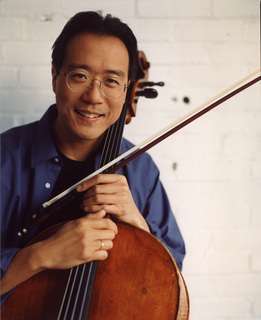|
Back
Entertaining Miniatures Upstaged Serious Sonatas Hong Kong
Hong Kong Cultural Center, Concert Hall
11/20/2009 -
Ennio Morricone: The Mission
George Gershwin: Prelude No. 2
Cesar Camargo Mariano: Cristal
Johannes Brahms: Cello Sonata No. 1 in E minor, Op. 38
Graham Fitkin: L
César Franck: Sonata in A major for Violin and Piano (Version for Cello and Piano)
Yo-Yo Ma (cello), Kathryn Stott (Piano)

Yo-Yo Ma (© Stephen Danelian)
Although Yo-Yo Ma frequently has performed in Hong Kong in recent years, his repertoire on Friday evening’s concert was a rarity. The renowned cellist has turned his interest to some cross-over works such as film music and Latin-American music –his two concerts with the HKPO and HKCO last year, and his recent releases were of this kind. But on Friday evening, he delivered two mainstream ‘classical’ pieces in his recital: Brahms’s Cello Sonata No. 1 and Franck’s famous Sonata for Violin and Piano, arranged for cello and piano. This could be a surprise for many of Ma’s fans.
The recital opened with three contemporary miniatures, all among Mr. Ma’s central repertoire. His trademark expressiveness and eloquence were telling exemplified. The hushed lyricism and jazzy glissandos made Gershwin’s Prelude (originally composed for the piano) especially memorable. He was also natively attuned to the film score by Morricone, a composer he is particularly fond, and the Brazilian work Cristal, which he recorded in 2003.
Although many audiences had a high anticipation on the following ‘classical’ cello sonata, it came across as a disappointment. Throughout the three movements, the cello and the piano could hardly achieve an ideal balance. Despite Ms. Stott’s deliberately reserved dynamics, during some forte passages, the piano was still too domineering. This was most exasperating in the fugal third movement, in which the dialogues between the cello and the piano were rarely interchanging. It sounded like a piano sonata with the cello as accompaniment. But all these were not the guilt of Ms. Stott, who tried to bring out Brahms’s German heaviness and profundity. It was Mr. Ma’s underpowered tone that sacrificed the balance between the two. Nevertheless, his innate expressivity and delicate articulation brought an exceptionally light-hearted reading of the second movement. Comparing to his recording of the same work with Ax in 1991, tonight’s rendition was filled with more expressive lyricism, but lacking a ‘German’ introspection.
The problem of intonation persisted in the second half. The opening main theme of Franck’s Sonata was slightly understated. When the music proceeded, the cello was gradually buried amid the piano’s big chords, particularly in the second Allegro movement, where Ms. Stott played a crucial role in bringing to the surface the music’s fury. The emotional intensity in the fourth movement, especially when the main theme returned, was also understated. Notwithstanding, Mr. Ma’s musical exquisiteness turned the slow third movement into a cantabile song. Every note was carefully polished and every phrase was sung with a long arching line.
For encore, Mr. Ma and Ms. Stott played three works by Piazzolla, Ravel, and Saint-Saëns respectively. It seemed this kind of entertaining miniatures is Mr. Ma’s real cup of tea.
Danny Kim-Nam Hui
|